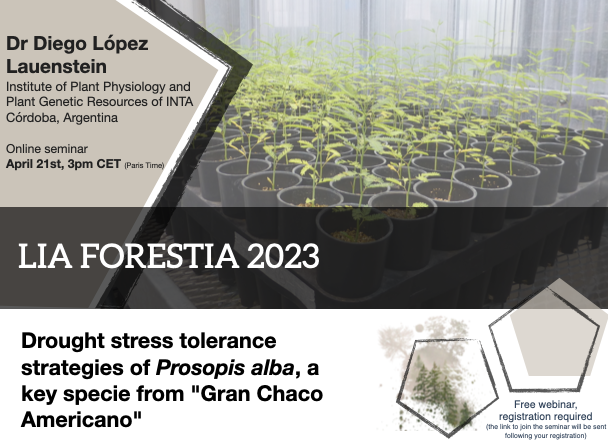LIA FORESTIA web seminars 2023
SEMINAR # 2
« Drought stress tolerance strategies of Prosopis alba, a key specie from « Gran Chaco Americano »
Diego López Lauenstein,
Institute of Plant Physiology and Plant Genetic Resources of INTA, Córdoba, Argentina
April 21st, 3pm (CET/Paris time)
Abstract
Drought is one of the major abiotic stresses that restrict terrestrial plant growth. Predicted climate change in subtropical regions raises concerns about the ability of forest ecosystems to cope with longer, more severe and unpredictable summer drought periods.
The Gran Chaco Americano extends into tropical and temperate zones and is one of the major wooded grasslands in South America, being currently one of the ecosystems with the highest deforestation rates of the world. Among important Chaco tree species, Prosopis spp, Algarrobos (Mesquite), are well-known to be tolerant to drought, having a xeromorphic leaf structure and an adapted root structure that can cope with temporal and spatial variability in soil water availability. In particular, Prosopis alba is the most widely distributed species of the genus, grows throughout the semi-arid and humid Chaco region of Argentina, Bolivia and Paraguay, covering areas from 500 to 1200 mm of average annual precipitation of summer concentration.
P. alba is distributed in contrasting environments, and we expect different strategies towards drought stress and even adaptations to particular local conditions. Our objective was to evaluate the strategies of Prosopis alba to tolerate drought stress and to identify if these strategies are under natural selection. By combining a macroscopic characterization (yellowing and senescence) after water deprivation in a controlled common garden experiment with open pollinated families and the distribution of neutral genetic variation (microsatellites) between and within P. alba populations we attempt to address the following questions: Do the different P. alba provenances growing in contrasting environments with respect to precipitation and temperature have different strategies to tolerate stress? Are there genetic differences between these provenances that may indicate adaptive processes?
In the context of climate change, information regarding Prosopis alba provenances tolerant to drought becomes more important, particularly for forest management and future (re)forestation.

Free registration following this link : LIA FORESTIA 2023 – seminar #2
Registration required to receive the link to join the seminar
MiDi is a interdisciplinary Research Thematic Network, focused on biodiversity and habitats and funded by the Centre-Val de Loire Region. The network aims to promote studies in multiple fields of BioGeoSciences and Human and Social Sciences in relation to global changes.
This conference is organised in partnership with Le Studium (Institute for Advanced Studies).
contact: rtrmidi@univ-tours.fr


